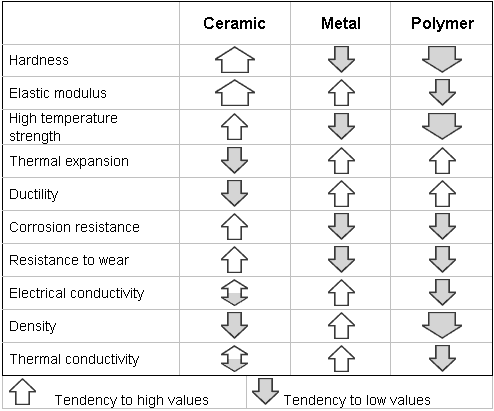5 Properties
of Technical Ceramics
5.1 General Comparison
The wide variety of application possibilities
for ceramic materials arise from their specific properties
which in many respects cannot be achieved by other materials.
To highlight some positive properties:
- low density,
- high hardness,
- high mechanical strength,
- dimensional stability (specific stiffness),
- resistance to wear,
- resistance to corrosion (resistance to chemical attack),
- weathering resistance,
- high working temperature,
- low or high thermal conductivity,
- good electrical insulation and
- dielectric and ferroelectric properties.
Depending on the composition and the processing of the raw
materials as well as on forming and the type of sintering,
the properties of the material can be closely tailored to
the desired application.
Figure 79, which compares the most important properties, simplifies
an assessment of the property profile of technical
ceramics as against metals and polymers.

Figure 79: A comparison of
the properties of ceramics, metals and polymers
The direction of the arrow indicates the
tendency in comparison with typical values. Any assessment
must depend on the particular application.
A broad arrow indicates a particularly strong manifestation
of the feature.
The characteristic properties of metals, ceramics and plastics
can be explained by the different nature of their atomic bonds.
|
|

